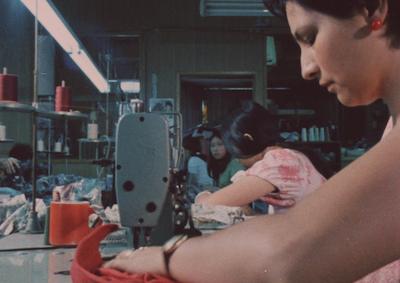Admission is free. No advance reservations. Seats are available on a first come, first served basis. Hammer Museum members will have reserved seating available at the box office. The box office opens one hour before the first program of the day.
Chicana
U.S., 1979
Los Angeles restoration premiere
“We fight for bread and roses” is the powerful conclusion to a film that pays tribute to “all the courageous and freedom loving women in the history of the Mexican-Chicano people.” Sylvia Morales’ remarkable Chicana acts as both a reflection of the time it was made — Morales was a UCLA student in the ’70s, an activist filmmaker, and part of the Chicanisma movement that advocated a feminist alternative to traditional narratives — and a continuing rallying cry as Latinx representation in media is still disgracefully low.
Period artifacts, artwork and contemporary scenes of women working are woven together with narration from renowned actor Carmen Zapata. Stories of women from as early as 1519 to the activism of Dolores Huerta and Alicia Escalante center the continuous fight against the colonialist structures imposed on them. Telling the matriarchal histories of the Americas using historical female figures, Chicana becomes less about history and more about how these movements are connected to the greater narrative of women fighting for space and equality, and combatting exploitation.
Inducted into the National Film Registry of the Library of Congress, Chicana is considered the first major feminist Chicana documentary. Sylvia Morales’ collection is held in the Chicano Studies Research Center collection at the UCLA Film & Television Archive.—Amanda Salazar
DCP, color, 23 min. Producer/Director: Sylvia Morales. Screenwriter: Anna Nieto-Gomez. With: Carmen Zapata.
Restoration funded by the National Film Preservation Foundation and the UCLA Film & Television Archive. Restored by the UCLA Film & Television Archive from a 16mm reversal print and 16mm magnetic track. Laboratory services by Roundabout Entertainment, Inc., Audio Mechanics. Special thanks to the Library of Congress, Sylvia Morales, UCLA Chicano Studies Research Center.
Requiem-29
U.S., 1970
Restoration world premiere
On August 29, 1970, the National Chicano Moratorium Movement held a demonstration in East Los Angeles that turned violent when police brutally attacked participants in trying to break up the legal, peaceful, anti-Vietnam War rally. Many people were injured and three died, including Los Angeles Times reporter Rubén Salazar.
Combining footage from the march and Salazar’s wake with interviews and incredible courtroom testimony, Requiem-29 exposes the brutal racial biases against the Latinx community at the hands of law enforcement, from the perspective of those experiencing it. The individual being questioned in the courtroom is journalist and activist Raul Ruiz, likely because as a photojournalist he had documentation of the protest. Over the course of just a few questions, tension mounts between Ruiz and the inquest officer as the inquiry deviates from the death of Salazar and to an attempt to cast doubt on Ruiz’s testimony. “You are questioning my integrity. I know this because I am a Mexicano,” he says, as the crowd applauds.
Filmed by students from UCLA’s Ethno-Communications Program, including David Garcia and Moctesuma Esparza, Requiem-29 was a class project that was intended to be a documentary about the march. But the emotional, grounded testimony and movement of the people in the streets becomes something larger than just what happened on that day. These lasting images are a powerful, pointed document of injustice that continues to counter the dominant narratives then and today. Requiem-29 has been inducted into the National Film Registry of the Library of Congress.—Amanda Salazar
DCP, color, 32 min. Producer: Moctesuma Esparza. Director: David Garcia.
Restoration funded by the Council on Library and Information Resources and the UCLA Film & Television Archive. Restored by the UCLA Film & Television Archive from 16mm prints. Laboratory services by Roundabout Entertainment, Inc. Special thanks to the Library of Congress; University of California, San Diego; UCLA Instructional Media Collections and Services; UCLA Chicano Studies Research Center.
Special thanks to our community partners: UCLA Alumni Association, UCLA Chicano Studies Research Center, UCLA School of Theater, Film and Television.
Watch before-and-after restoration clips:






 Mobile Navigation
Mobile Navigation

